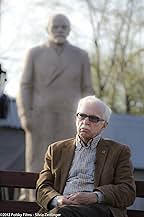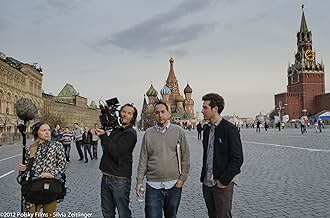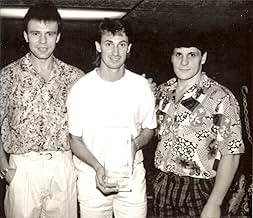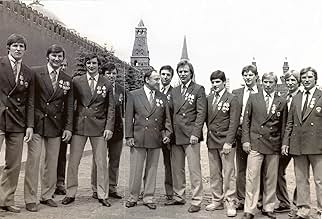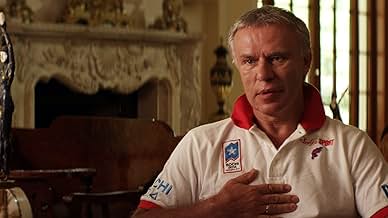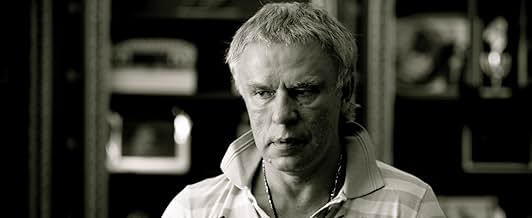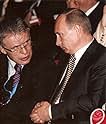IMDb RATING
7.6/10
7.4K
YOUR RATING
The story of the Soviet Union's famed Red Army hockey team through the eyes of its players.The story of the Soviet Union's famed Red Army hockey team through the eyes of its players.The story of the Soviet Union's famed Red Army hockey team through the eyes of its players.
- Awards
- 5 wins & 11 nominations total
Viacheslav Fetisov
- Self
- (as Slava Fetisov)
Herb Brooks
- Self - US Olympic Coach
- (archive footage)
- (voice)
Don Cherry
- Self - Hockey Commentator
- (archive footage)
- (voice)
- Director
- Writer
- All cast & crew
- Production, box office & more at IMDbPro
Featured reviews
Red Army (2014) documentary, directed by Gabriel Polsky, retells the story of probably the greatest dynasty in the history of sports, the Soviet Union national ice hockey team of the 1980's, and its best five-man unit featuring Viacheslav Fetisov and Alexei Kasatonov on defense, Vladimir Krutov, Igor Larionov, and Sergei Makarov (aka the KLM Line) at forwards, all in their 20s, aided by the legendary goalie, Vladislav Tretiak, in his 30s. The five dominated national and international hockey for nearly a decade.
Anatoli Tarasov, Russian hockey coaching pioneer, laid the foundation of their game and it was based on organized team movements and creativity to win the space, as well as individual puck control and its timely transfer into an empty space in the next zone of the rink, ultimately passing it over to a player in prosperous scoring position.
Soviet players, additionally subjected to military discipline included by Tarasov's successor, head coach Vladimir Tikhonov, who took over the Soviet national team in 1977, skated three times a day, eleven months of the year, "perfecting both, their individual skills and their teamwork." Knowing that "copy is never as good as the original", creative "father of Russian hockey", Tarasov, sought inspiration from other team sports, even from theatrical arts, primarily ballet, to create a unique style, "a completely new way of playing hockey, which changed the sport".
I was lucky to attend two matches of this incredible hockey team in the 1984 Winter Olympics in Sarajevo, the first one early in the competition and the second one in the finals. In the opening round, against Cuba, USSR had an easy task to win, and in addition to watching the great team performance I was enjoying individual virtuosity of USSR players, who managed to combine two seemingly incompatible traits, improvisation with harmonious and fluent team play, comparable maybe only to similar traits of the best jazz orchestras.
As I have been coincidentally seated right in front of him, I was also listening to the professional comments of Ivica Osim, one of the greatest footballers to grace the soccer fields of Sarajevo, who has had that far spent most of his active career whether playing for or coaching my favourite local team "Zeljeznicar", and was on his way to coach the national team of Yugoslavia soon. It was pure delight to listen to professional comments this great football enthusiast and expert had about the style and strategy of the Soviet national hockey team, and about the skills of its players, as well as comparison between the two sports, level of individual skills and tactics applicable in both. I can clearly remember Osim's comments and his longing for soccer outfield players of comparable individual skills, applicable in so called total football, based extensively on players' capability to cover not only for their nominal positions in the field, but rather, should it become required, to take over the role of any other player in the team.
Strength of this team, composed of players with incomparable skills was shown in the final game. Although the end result was not impressive, 2:0, nearly routine execution left no doubt who's dominant, and another participant, Czechoslovakia, practically had never had a chance to win.
Documentary, cleverly composed from interviews with three players of thus far surely the best five skater hockey unit ever to hit the ice, and from mixture of archive footage from their games, trainings and other life events, by showing how great and undefeatable they have been, really does them a great justice. Therefore, in the rest of this review I'll rather just add the words of the "Red Army" director, copied from a featurette "Gabe Polsky Hockey Commentary" found on a DVD:
(Red Army-Director Gabe Polsky discusses the essence of Soviet hockey-2014)
"I'm Gabe Polsky and I directed the movie Red Army. The Film is about the Soviet Union and the greatest sports dynasty in history. The Soviet Union national hockey team revolutionized sport, they took hockey and sport to a whole new creative level. When I was a young kid and I watched for the first time (the) Soviet Union play in a 1987 Canada Cup VHS tape it was a religious experience, it was incredible what they did on the ice creatively. This was the best hockey ever played in history. In the series you saw the greatest players from the Soviet Union face off against the greatest Canadian players. (Starting Line-ups: USSR (Fetisov, Makarov, Larionov, Krutov, Kasatonov) vs Canada (Grossman, Gartner, Gretzky, Messier, Bourque).) The Soviet style play here is like a finely tuned symphony: the passing, weaving, improvisation. (Situation description) Krutov hits the puck out of the air to his team mate Makarov who has a breakaway: improvisation and awareness. (Situation description) Here we see how they knew each other so well they could almost play blindfolded together. The passing is like an artistic tapestry. They transitioned fast and confused defenders with their movement. (Situation description) Here we see incredible skill and creativity, and a sense of one another. This kind of hockey was incredibly fun to watch. (Situation description) Here we see how quickly they punish you for mistakes. (Situation description) This is one of my favourite players showing the skill level of the Soviet players... (Situation description) The Soviet game and style is all about puck possession and passing we see here. (Situation description) Here's Sergei Makarov, one of the greatest magicians in hockey history, passes to Krutov and then has an accurate shot. (Situation description) Here tremendous skill, being able to shoot from any position. (Situation description) And this here (Demiensky breakthrough and score), my friend, is pure art... the essence of hockey."
Learning the essence and enjoying the art of ice hockey, indeed, while delightfully watching masters of the ice rink in their stellar moments.
Anatoli Tarasov, Russian hockey coaching pioneer, laid the foundation of their game and it was based on organized team movements and creativity to win the space, as well as individual puck control and its timely transfer into an empty space in the next zone of the rink, ultimately passing it over to a player in prosperous scoring position.
Soviet players, additionally subjected to military discipline included by Tarasov's successor, head coach Vladimir Tikhonov, who took over the Soviet national team in 1977, skated three times a day, eleven months of the year, "perfecting both, their individual skills and their teamwork." Knowing that "copy is never as good as the original", creative "father of Russian hockey", Tarasov, sought inspiration from other team sports, even from theatrical arts, primarily ballet, to create a unique style, "a completely new way of playing hockey, which changed the sport".
I was lucky to attend two matches of this incredible hockey team in the 1984 Winter Olympics in Sarajevo, the first one early in the competition and the second one in the finals. In the opening round, against Cuba, USSR had an easy task to win, and in addition to watching the great team performance I was enjoying individual virtuosity of USSR players, who managed to combine two seemingly incompatible traits, improvisation with harmonious and fluent team play, comparable maybe only to similar traits of the best jazz orchestras.
As I have been coincidentally seated right in front of him, I was also listening to the professional comments of Ivica Osim, one of the greatest footballers to grace the soccer fields of Sarajevo, who has had that far spent most of his active career whether playing for or coaching my favourite local team "Zeljeznicar", and was on his way to coach the national team of Yugoslavia soon. It was pure delight to listen to professional comments this great football enthusiast and expert had about the style and strategy of the Soviet national hockey team, and about the skills of its players, as well as comparison between the two sports, level of individual skills and tactics applicable in both. I can clearly remember Osim's comments and his longing for soccer outfield players of comparable individual skills, applicable in so called total football, based extensively on players' capability to cover not only for their nominal positions in the field, but rather, should it become required, to take over the role of any other player in the team.
Strength of this team, composed of players with incomparable skills was shown in the final game. Although the end result was not impressive, 2:0, nearly routine execution left no doubt who's dominant, and another participant, Czechoslovakia, practically had never had a chance to win.
Documentary, cleverly composed from interviews with three players of thus far surely the best five skater hockey unit ever to hit the ice, and from mixture of archive footage from their games, trainings and other life events, by showing how great and undefeatable they have been, really does them a great justice. Therefore, in the rest of this review I'll rather just add the words of the "Red Army" director, copied from a featurette "Gabe Polsky Hockey Commentary" found on a DVD:
(Red Army-Director Gabe Polsky discusses the essence of Soviet hockey-2014)
"I'm Gabe Polsky and I directed the movie Red Army. The Film is about the Soviet Union and the greatest sports dynasty in history. The Soviet Union national hockey team revolutionized sport, they took hockey and sport to a whole new creative level. When I was a young kid and I watched for the first time (the) Soviet Union play in a 1987 Canada Cup VHS tape it was a religious experience, it was incredible what they did on the ice creatively. This was the best hockey ever played in history. In the series you saw the greatest players from the Soviet Union face off against the greatest Canadian players. (Starting Line-ups: USSR (Fetisov, Makarov, Larionov, Krutov, Kasatonov) vs Canada (Grossman, Gartner, Gretzky, Messier, Bourque).) The Soviet style play here is like a finely tuned symphony: the passing, weaving, improvisation. (Situation description) Krutov hits the puck out of the air to his team mate Makarov who has a breakaway: improvisation and awareness. (Situation description) Here we see how they knew each other so well they could almost play blindfolded together. The passing is like an artistic tapestry. They transitioned fast and confused defenders with their movement. (Situation description) Here we see incredible skill and creativity, and a sense of one another. This kind of hockey was incredibly fun to watch. (Situation description) Here we see how quickly they punish you for mistakes. (Situation description) This is one of my favourite players showing the skill level of the Soviet players... (Situation description) The Soviet game and style is all about puck possession and passing we see here. (Situation description) Here's Sergei Makarov, one of the greatest magicians in hockey history, passes to Krutov and then has an accurate shot. (Situation description) Here tremendous skill, being able to shoot from any position. (Situation description) And this here (Demiensky breakthrough and score), my friend, is pure art... the essence of hockey."
Learning the essence and enjoying the art of ice hockey, indeed, while delightfully watching masters of the ice rink in their stellar moments.
There has never been such beauty in sport than ice hockey performed by the Soviet Union at its best. How was it possible? It's pretty obvious that it all was due to propaganda reasons. The Communist human was superior, according to Soviet leaders. Or at least they wanted to think so; but the almost only way to prove it was through the athletes.
The legendary Fetisov tells most of the story here. How the players were kept almost as slaves under the regime of KGB man Tichonov. And when finally the Soviet system broke down, Fetisov and his comrades were allowed to play in NHL. But had to give most of their money to the embassy.
A sometimes breathtaking documentary and the system succeeded in creating some of the best athletes ever. And yes, they impressed the West. But the price was high.
The legendary Fetisov tells most of the story here. How the players were kept almost as slaves under the regime of KGB man Tichonov. And when finally the Soviet system broke down, Fetisov and his comrades were allowed to play in NHL. But had to give most of their money to the embassy.
A sometimes breathtaking documentary and the system succeeded in creating some of the best athletes ever. And yes, they impressed the West. But the price was high.
"Do you believe in miracles?! YES!!" That was sportscaster Al Michaels' immortal exaltation at the end of the 1980 Olympic hockey game which became known as "The Miracle on Ice". An American team of amateur and college hockey players had defeated the vaunted team from the Soviet Union, which had won the gold medal in the last four Winter Olympics and six of the last seven. The U.S. team would go on to win the gold medal by defeating Finland. The highly improbable American victory over the Russians was named by Sports Illustrated as the greatest sports moment of the 20th century and spawned a TV movie, a documentary film and the 2004 feature "Miracle" starring Kurt Russell. But what of the Soviet team? How did this shocking loss affect them? And was this the beginning of the end for Russian dominance of international ice hockey? The documentary "Red Army" (PG, 1:25) answers those questions and many more as it delves into the stories of the men behind the hockey masks and the dramatic history of their national sport.
The story of the Soviet Red Army hockey program is one of athletic, social, political and military influences that reflected the larger phenomenon of the Cold War and dictated the fates of those involved. This film contains the kind of interviews that you'd expect from such a documentary and also uses little-seen archival footage, creative modern graphics and skilled editing to tell this story in a very engaging way. The main interviewee is Soviet team captain Viacheslav Fetisov who describes his story as it felt back then and apparently still feels today. Interviews with his wife, his former teammates, a former KGB agent and a few journalists tell of their experiences and give valuable color commentary, but just as revealing is what is NOT said in the documentary. Co-producer, director, writer and interviewer Gabe Polsky is smart enough to turn the camera on early, keep it rolling and edit into the film the honesty and emotion that shows itself in the candid moments and unguarded reactions of his interviewees.
The film's scope covers over four decades of the Soviet Union's hockey program, but focuses mainly on the 1980s, a decade which began with Cold War tensions heightened by the Soviet invasion of Afghanistan and ended with the rapid decline of the USSR as a unified state. During this period, Fetisov and his teammates absorbed that crushing Olympic defeat, dealt with the changes that followed, rose to new challenges and, eventually, began to consider careers in the NHL, as the Soviet government gradually loosened its strong grip on its players, just as it began losing control of its people and its empire. Polsky uses all the tools at his disposal to illustrate how the Russians ran their program and what that program meant to the country. We see children from all over their massive and diverse nation training, playing and competing within the program. We observe "the best of the best of the best", as one interviewee describes them, transition from hockey players to Russian icons, and cogs in the Soviet Union's propaganda machine. We learn that these elite players were to place hockey above literally everything else in their lives. We come to understand that their purpose was to embody the superiority of their communist system. We get to peek behind the Iron Curtain and contemplate an untold story unlike any other in sports.
"Red Army" doesn't just reveal the untold story of the Soviet Union's ice hockey program, but helps us see that the men involved were more than their government's propaganda puppets, but were human beings with desires for their lives, both common and uncommon problems, and impressive amounts of talent and work ethic. This is a documentary that feels like a drama. The film brings openness to a notoriously closed system and tells a story that most audience members have never thought about, but will be unable to avoid thinking about after seeing this movie. The only weak spot I noticed was the soundbites of the director's amateurish interviewing techniques. That aside, this is a fascinating film which raises the bar for future documentaries of its kind. "A-"
The story of the Soviet Red Army hockey program is one of athletic, social, political and military influences that reflected the larger phenomenon of the Cold War and dictated the fates of those involved. This film contains the kind of interviews that you'd expect from such a documentary and also uses little-seen archival footage, creative modern graphics and skilled editing to tell this story in a very engaging way. The main interviewee is Soviet team captain Viacheslav Fetisov who describes his story as it felt back then and apparently still feels today. Interviews with his wife, his former teammates, a former KGB agent and a few journalists tell of their experiences and give valuable color commentary, but just as revealing is what is NOT said in the documentary. Co-producer, director, writer and interviewer Gabe Polsky is smart enough to turn the camera on early, keep it rolling and edit into the film the honesty and emotion that shows itself in the candid moments and unguarded reactions of his interviewees.
The film's scope covers over four decades of the Soviet Union's hockey program, but focuses mainly on the 1980s, a decade which began with Cold War tensions heightened by the Soviet invasion of Afghanistan and ended with the rapid decline of the USSR as a unified state. During this period, Fetisov and his teammates absorbed that crushing Olympic defeat, dealt with the changes that followed, rose to new challenges and, eventually, began to consider careers in the NHL, as the Soviet government gradually loosened its strong grip on its players, just as it began losing control of its people and its empire. Polsky uses all the tools at his disposal to illustrate how the Russians ran their program and what that program meant to the country. We see children from all over their massive and diverse nation training, playing and competing within the program. We observe "the best of the best of the best", as one interviewee describes them, transition from hockey players to Russian icons, and cogs in the Soviet Union's propaganda machine. We learn that these elite players were to place hockey above literally everything else in their lives. We come to understand that their purpose was to embody the superiority of their communist system. We get to peek behind the Iron Curtain and contemplate an untold story unlike any other in sports.
"Red Army" doesn't just reveal the untold story of the Soviet Union's ice hockey program, but helps us see that the men involved were more than their government's propaganda puppets, but were human beings with desires for their lives, both common and uncommon problems, and impressive amounts of talent and work ethic. This is a documentary that feels like a drama. The film brings openness to a notoriously closed system and tells a story that most audience members have never thought about, but will be unable to avoid thinking about after seeing this movie. The only weak spot I noticed was the soundbites of the director's amateurish interviewing techniques. That aside, this is a fascinating film which raises the bar for future documentaries of its kind. "A-"
I came away from this movie deep in thought, trying to piece together the personal journeys of the cast, the context of life in the USSR, the changes and resulting impact upon the players lives.
This documentary is well researched and highly viewable, it is not just a male only film.
Women get to see stripped to the bare bone, deep male team bonding, open responses to complex relationships and real meaning as to how 5 men dominated a sport in the USSR and the Americas.
The death of one of the cast members shortly after the movie added a melancholy touches, yet there is humour from both Gabe Polsky and Vyacheslav Fetisov.
It was clever, I see this documentary staying around for some time, certainly one to watch again.
This documentary is well researched and highly viewable, it is not just a male only film.
Women get to see stripped to the bare bone, deep male team bonding, open responses to complex relationships and real meaning as to how 5 men dominated a sport in the USSR and the Americas.
The death of one of the cast members shortly after the movie added a melancholy touches, yet there is humour from both Gabe Polsky and Vyacheslav Fetisov.
It was clever, I see this documentary staying around for some time, certainly one to watch again.
Sometimes sports can seem like they have a bloated sense of self-importance but it can resonate in the grand scheme of geopolitics. The Cold War was indeed an era of tension and it manifested itself most publicly when the Soviet Union brought its teams to North America. It wasn't just teams representing countries, but they were representing ways of life - America, the capitalist way of life, and the Soviet Union, the communist way of life. And ostensibly, those lifestyles determine who has the better players, at least that's what they wanted the teams to think. When you hear that a country has beaten Canada at hockey, you know that means business. However, the documentary Red Army shows how the Soviet Union team members, who are all world class athletes, become disenchanted with their leadership and are recruited over to American leagues.
As expected, the attitude of the Russians today in the interviews are amusing and intimidating. Director Gabe Polsky feeds off the candid moments he captures, even if that results in the participants condescending him. With very deliberate motions with the camera, he capitalises on moments that other directors would have considered an outtake. There's a sense of humour and a sense of danger constantly bubbling, and Polsky's collection of archive footage always perfectly illustrates the portrait that the anecdotes form. It shows a skill in hockey that I've never seen before and Polsky makes it quite poetic at times. However sometimes its drama is too boisterous, but it's only real crux is that with such a big team it's hard for it to stay focused and follow all its characters at once. While it's most likely drenched in bias coming from an American, but pushing politics aside, it's the individual lives that matter.
8/10
As expected, the attitude of the Russians today in the interviews are amusing and intimidating. Director Gabe Polsky feeds off the candid moments he captures, even if that results in the participants condescending him. With very deliberate motions with the camera, he capitalises on moments that other directors would have considered an outtake. There's a sense of humour and a sense of danger constantly bubbling, and Polsky's collection of archive footage always perfectly illustrates the portrait that the anecdotes form. It shows a skill in hockey that I've never seen before and Polsky makes it quite poetic at times. However sometimes its drama is too boisterous, but it's only real crux is that with such a big team it's hard for it to stay focused and follow all its characters at once. While it's most likely drenched in bias coming from an American, but pushing politics aside, it's the individual lives that matter.
8/10
Did you know
- Quotes
(voice): [confused] Wait a second. Go Back. I don't get why Yazov let you leave the country, if he was mad at you.
Viacheslav Fetisov: I'm not a historian. My feeling was the country tried to change something, because it's Perestroika time, but he doesn't want changes. Everybody was afraid. It's understandable. It's like in a dark room, trying to find a dark cat. It's not funny.
[still confused]
(voice): Okay.
- ConnectionsFeatured in Docventures: Urheilu (2015)
- How long is Red Army?Powered by Alexa
Details
- Release date
- Countries of origin
- Official site
- Languages
- Also known as
- Красная армия
- Production company
- See more company credits at IMDbPro
Box office
- Gross US & Canada
- $694,600
- Opening weekend US & Canada
- $20,100
- Jan 25, 2015
- Gross worldwide
- $798,680
- Runtime
- 1h 24m(84 min)
- Color
- Aspect ratio
- 1.85 : 1
Contribute to this page
Suggest an edit or add missing content







